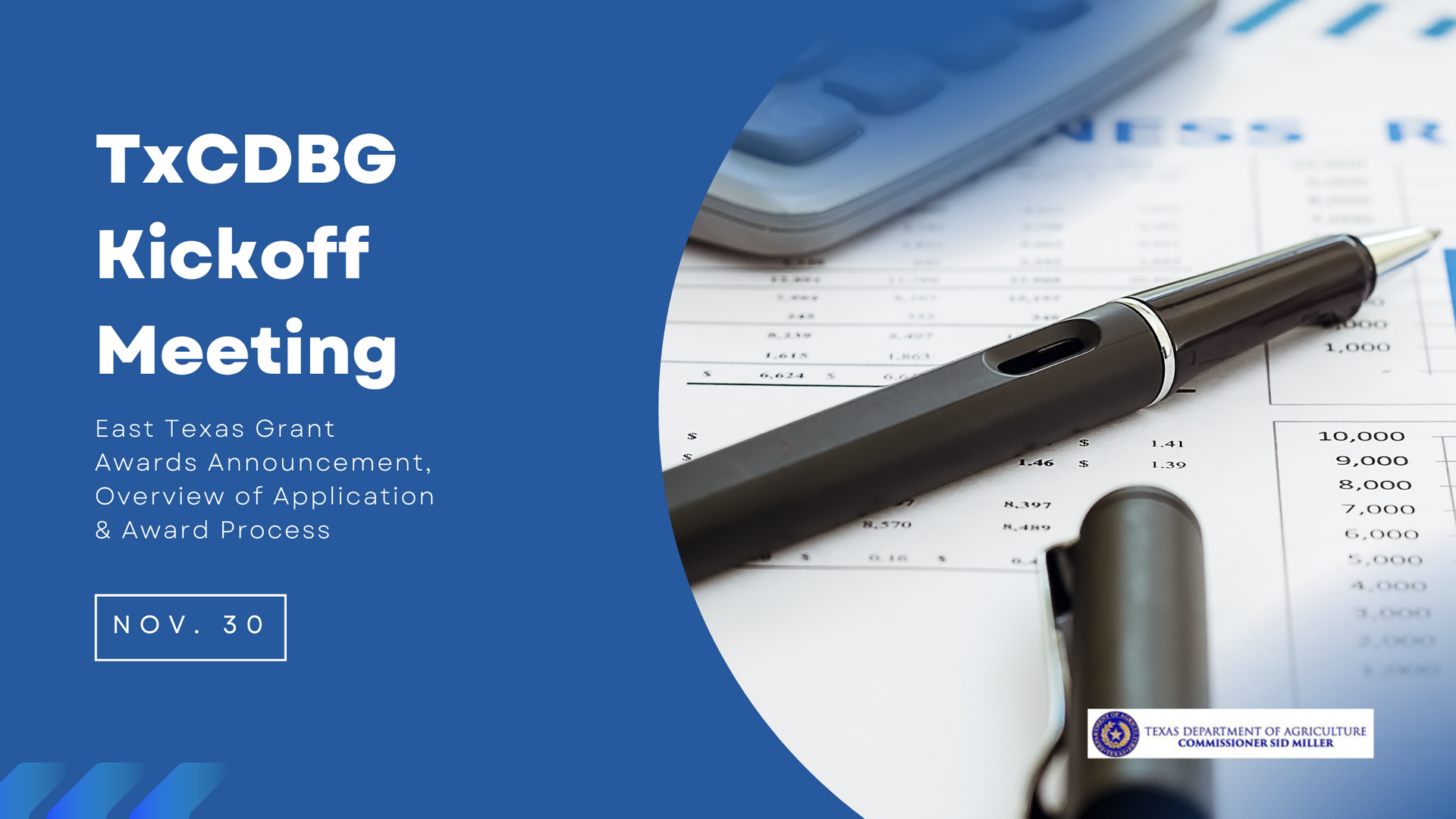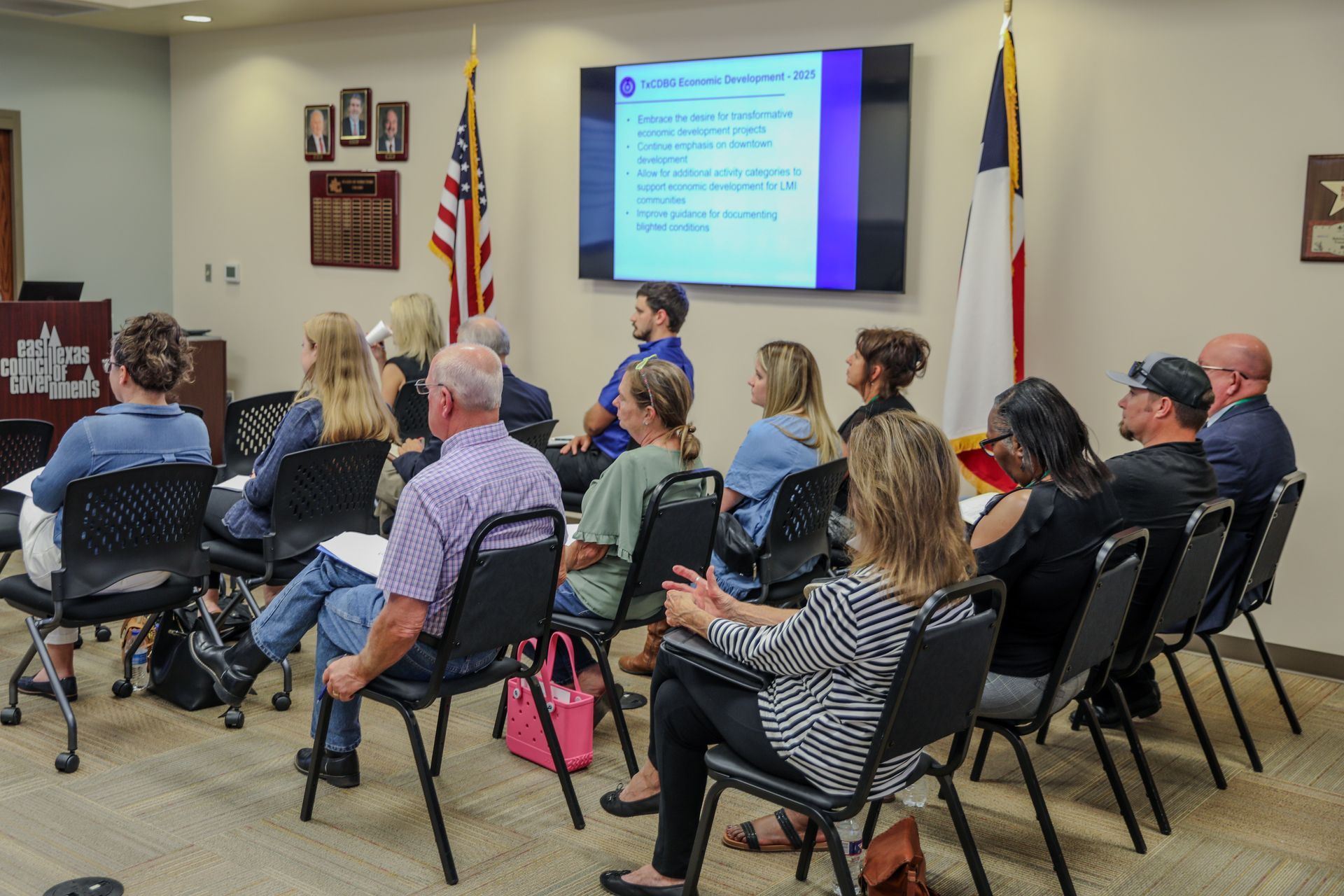November 14, 2023
ETCOG to Host TxCDBG Kickoff Meeting on Nov. 30

ETCOG is proud to host the Texas Department of Agriculture on November 30th to hold a TxCDBG Kickoff Meeting. Join us to hear about grant allocations planned for our region and an overview of proposed changes to the application process. Regional input is welcomed on how TDA can best serve non-entitlement communities through the revised application process.
Questions? Contact our Economic Development Team!
Lynda David, 903.218.6457 or
Rebecca Gage, 903.218.6499

ETCOG is proud to host the Texas Department of Agriculture on March 12th to hold a TxCDBG Regional Outreach Meeting. Join us to hear a TxCDBG grant program overview of requirements, allocation formula, upcoming funding opportunities, and TDA's one-year action plan. Eligible applicants in our region are all non-entitlement communities, which include all of our cities with the exception of Tyler, Marshall, and Longview. When Thursday, March 12, 2026 10:00 AM Where ETCOG Headquarters 3800 Stone Road Kilgore, TX 75662 Please RSVP your attendance !

In today's rapidly changing economic landscape, it has become evident that institutions of higher education play a crucial role in fostering vibrant economic ecosystems. These universities possess a wealth of economic development assets that can propel regional growth and innovation. Recognizing this immense potential, the Economic Development Administration (EDA) has established the University Center program (PDF) to empower universities and consortia of institutions to establish and operate University Centers (UCs). The primary focus of these UCs is to harness the resources and capabilities of universities to build robust regional economic ecosystems that foster innovation, high-growth entrepreneurship, resiliency, and inclusiveness. Since as early as FY 1980, EDA-funded UCs have been actively responding to the needs of small- and medium-sized manufacturers and processors by providing crucial technology transfer and commercialization assistance. Today, these UCs continue to evolve and adapt to the changing needs of their regions. Some UCs are at the forefront of creating a digitally inclusive economy, offering valuable resources and guidance in this digital age. Others are addressing the economic impacts resulting from the closure of major plants by collaborating with stakeholders in their regions. The strength of University Centers lies in their collaborative approach. They work hand-in-hand with other EDA partners, such as Economic Development Districts (EDDs), to combine their expertise, applied research, and technical assistance. This collaboration is aimed at developing, implementing, and supporting regional strategies that lead to tangible outcomes like job creation, the cultivation of high-skilled regional talent pools, and business expansion within innovation clusters. University Centers focus on several key areas, each crucial for the growth and resilience of a region. One such area is regional commercialization efforts. By leveraging university assets and expertise, UCs help bridge the gap between innovative research and commercial viability. They facilitate the transfer of cutting-edge technologies and intellectual property into the market, propelling the growth of local businesses and industries. If you are a university or part of a consortium of institutions passionate about driving regional economic growth, innovation, and resiliency, the EDA's University Center program presents an incredible opportunity. Joining this program will enable you to leverage the vast resources, expertise, and collaborative network of UCs to make a lasting impact on your region. To learn more about applying for the University Centers funding opportunity, please visit https://bit.ly/3ot5EQn .


